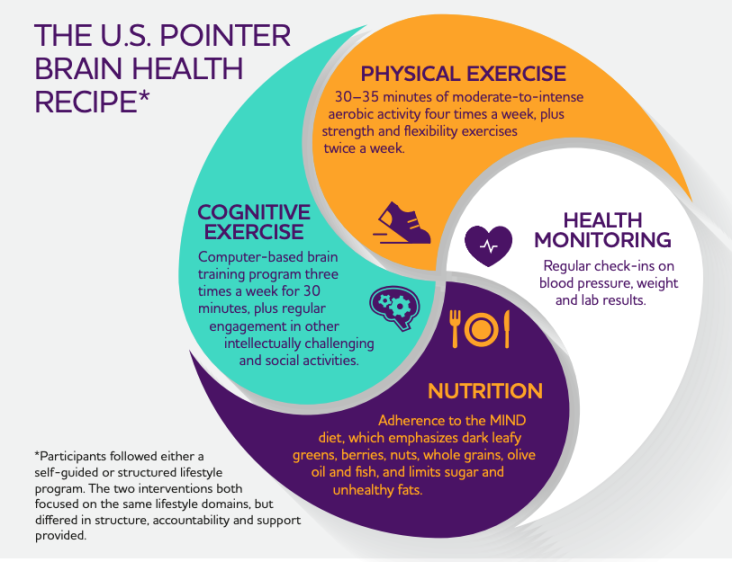The Alzheimer’s Association International Conference is the largest international meeting dedicated to advancing dementia science and clinical practice. Each year, AAIC convenes researchers, clinicians, and dementia professionals from all career stages to share breaking research discoveries and clinical practice education that will lead to improvements in diagnosis, risk reduction, and treatments for Alzheimer’s disease and other dementia. Here are three key takeaways from the ongoing conference.
U.S. POINTER results: Healthy behaviors have a powerful impact on brain health
U.S. POINTER (U.S. Study to Protect Brain Health Through Lifestyle Intervention to Reduce Risk) is a two-year, multisite clinical trial assessing two different lifestyle intervention programs in a diverse population of older adults at risk for cognitive decline and dementia. The interventions focused on physical and cognitive exercise, nutrition, and health monitoring. The study showed that both interventions improved memory and thinking in older adults at risk of cognitive decline. A structured intervention providing more intensity, support, and accountability showed greater improvement compared to a self-guided intervention. The US Pointer Brain Health Recipe used in the study protocol is available to view.
The benefits to brain health were consistent across age, sex, ethnicity, heart health status and genetic risk (apolipoprotein E-e4 genotype). Looking forward, the Alzheimer's Association announced plans to "build on the momentum of U.S. POINTER by launching several programs and initiatives, including a personal brain health assessment tool, a virtual brain health training program for health care providers, a community recognition program for organizations championing brain health, and a brain health roundtable that will unite leaders across health care, public health, community and corporate sectors to accelerate impact." The results are now published in The Journal of the American Medical Association.
Real-world data on amyloid-clearing infusion treatment for Alzheimer's
In 2023, the FDA approved Eisai’s amyloid-clearing infusion treatment Leqembi for early-stage Alzheimer’s disease, followed by Eli Lilly’s Kisunla in 2024. Now, MBWC researchers are assessing how much clinical infrastructure is needed to safely deliver the drugs. MBWC's Dr. Michael Rosenbloom, MD, Associate Professor of Neurology at UW Medicine, presented a study that addressed the question, 'Is it better to get Leqembi treatment at a large academic-affiliated clinic or a private practice neurology clinic?' Neurology clinics, such as the MBWC, are affiliated with universities and Alzheimer’s Disease Research Centers and have more infrastructure to operate amyloid PET scans for diagnosis and MRI machines for monitoring side effects. The study, published in the Journal of Neurology, assessed the treatment of 165 patients with Leqembi across two different clinics. Patients treated at the academic clinic were more likely to have mild cognitive impairment (MCI), and those seen in a private clinic were at a later stage of the disease. However, even though people got diagnoses of Alzheimer’s earlier in the academic clinic, it took an average of 50 days longer than in the private clinic to start treatment after the diagnosis. The results show that Leqembi treatment in private clinics is just as safe as it would be in an academic setting. The message of the study is that the sooner someone gets diagnosed and starts treatment, the better, Dr. Rosenbloom said at AAIC 2025.
Alzheimer’s Association presented its first clinical practice guidelines for blood tests, providing a resource for medical professionals.
The Alzheimer’s Association released its first clinical practice guidelines for the use of blood-based biomarker tests by specialists to assess levels of Alzheimer’s disease pathology in individuals with objective cognitive impairment, including those with mild cognitive impairment (MCI) or dementia. Blood tests offer a less invasive, more accessible alternative to brain scans or lumbar punctures, which can be expensive or uncomfortable for some patients. A panel of 11 clinicians convened by the Alzheimer’s Association, including clinical neurologists, geriatricians, nurse practitioners, and physician assistants, conducted a systematic review and created evidence-based recommendations for using blood-based biomarkers in Alzheimer's care. Final recommendations were informed by public comments and input from the Association’s National Early-Stage Advisory Group, which includes people living with early-stage Alzheimer’s. These and other guidelines are part of ALZPro™, the Alzheimer’s Association’s central hub for evidence-based resources to help clinicians identify the disease early and ensure patients receive the right treatment as quickly as possible.





